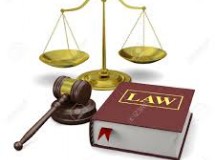- vintage bible book studio isolated image by dinostock from Fotolia.com
When a crime is committed, law enforcement investigates. Law enforcement collects evidence, interviews witnesses and conducts searches. When enough proof has been gathered, the alleged perpetrator of the crime is arrested. The 14th Amendment to the United States Constitution guarantees every citizen due process of law. That means that anyone charged with a crime is entitled to the course of legal proceedings that safeguard against unfair, arbitrary or unreasonable treatment within the criminal justice system. - The arrest of the suspect by the police is the first step in the process. The suspect is taken into custody, fingerprinted and photographed. Within 24 hours of being arrested, the suspect, now referred to as the defendant, appears before a judge who will set bail that will enable the defendant to be released from jail until trial.
- The next step of the process is the arraignment, a criminal proceeding in which the charges are formally read to the defendant. The judge will also determine whether the defendant has an attorney or will need the assistance of court-appointed counsel. The defendant is also asked to enter a plea to the charges. The judge will set dates for future court appearances and consider any changes to bail conditions if requested by either the prosecutor or the defendant.
- The purpose of the preliminary hearing is to determine whether there is probable cause to believe that a crime occurred and that the defendant is the one who committed the crime. In a felony charge, if the judge decides that there is probable cause, then the case goes before a grand jury. For misdemeanor charges, the case is scheduled for pretrial hearing.
- The grand jury hearings are closed proceedings. There is no judge presiding, and neither the defendant nor the defendant's attorney is allowed to attend. The prosecutor presents the case through evidence and witnesses, and the grand jury decides whether there is probable cause to prosecute the suspect for a felony.
- The pretrial hearing, sometimes called a suppression hearing, is a meeting prior to the criminal trial at which the prosecutor and defense attorney make arguments and file motions on evidentiary questions such as whether a confession should be admitted as evidence, whether or not certain witnesses can testify and what they can testify to. Sometimes at the pretrial hearing, the prosecutor and the defense attorney work out a plea bargain, under which the defendant agrees to plead guilty to a lesser charge for an agreed-upon sentence.
- The defendant has a right to have a verdict decided by a jury (called a jury trial) or by a judge (called a bench trial). Both sides offer opening statements. Then the prosecution presents its case. When the prosecution rests, the defense presents its case. Both sides then offer closing arguments. The jury (or judge if a bench trial) will find the defendant guilty on all, some, or none of the charges. If the defendant is found not guilty, it is referred to as an acquittal. Once acquitted, a defendant can never be charged for the same offense again (called double jeopardy). If a jury cannot reach a verdict, then the judge rules a mistrial and the case is usually retried.
Arrest
Arraignment
Preliminary Hearing
Grand Jury
Pretrial Hearing
Trial
SHARE







































